Dental Implants – Cranford, NJ
Modern Tooth Replacement for Longer-Lasting Smiles
As a periodontal practice that regularly sees patients suffering from tooth loss, our team of board-certified specialists is skilled and trained to provide modern tooth replacement solutions for longer-lasting smiles. We accomplish this by using dental implants. Superior in their ability to restore the entire root-to-crown structure, these prosthetics deliver countless benefits that cannot be obtained by any other form of restorative dental care. At our office, we can treat all kinds of cases ranging from simple dental implants to All-On-4 implant dentures. No matter how many teeth you are missing, our team of experts can help you regain the confidence you deserve with dental implants.
Why Choose Cranford Center for Periodontics & Dental Implants for Dental Implants?
- Dental Implant Placement by Periodontic Specialists
- Sedation Dentistry for Anxious Patients
- Expertise to Handle the Most Complex Cases
What Are Dental Implants?

Dental implants are titanium posts that are surgically placed in the jawbone and mimic natural tooth roots. Designed to create a solid foundation for your new smile, these prosthetics help to support dental crowns, bridges, or dentures depending on how many teeth you are missing. Known for fusing well with the jawbone, they look and function naturally so that you can enjoy a new and improved smile.
The 4-Step Dental Implant Process

Since dental implants require a specialized multi-step process, placing them can take several months longer than crafting traditional restorations like dentures and dental bridges. However, implants deliver a wide range of amazing benefits that make them well worth the additional time and effort. The team at the Cranford Center for Periodontics & Dental Implants is trained and equipped to complete the whole dental implant placement process in-house, and, while each patient’s treatment plan is unique, you can expect yours to include the following steps:
Initial Dental Implant Consultation

We’ll welcome you to our office for a thorough consultation to determine your candidacy for dental implant treatment. If you have oral infections like gum disease or your jawbones are too thin for implants, we may be able to schedule you for the appropriate preliminary procedures that can give you a sufficiently stable and supportive foundation for your new teeth. We can perform periodontal therapy to clear up gum disease at our office, and we’ll be happy to help you book a consultation for bone grafting if necessary.
Dental Implant Surgery

Our team of board-certified periodontists will administer local anesthesia to numb your mouth before installing each implant post into its corresponding position in your jaw before closing the gum tissue. We’ll then place protective caps over the post and provide you with detailed aftercare instructions so you can enjoy a smooth recovery process. These will probably include refraining from smoking and alcohol, practicing excellent oral hygiene, and avoiding chewing around the parts of the jaw that received implants.
Dental Implant Osseointegration & Abutment
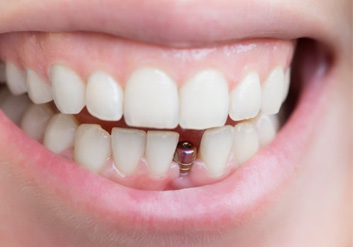
While you can resume your normal activities soon after your implant is placed, it’s essential to take the proper steps for healthy osseointegration. This is the process that allows titanium to naturally fuse with healthy bone tissue, and it gives dental implants the sturdy foundation they need to function like real teeth. This process can take anywhere from three to six months, and you’ll come back to our office once it is complete so we can place abutment pieces on your implants. These devices will allow your implants to support a lifelike dental restoration.
Delivery of Dental Implant Restoration(s)

Depending on how many teeth you are missing, you will receive a customized dental crown, bridge, or denture that restores your complete smile and allows it to function normally. After we check to make sure your bite is comfortable and make any necessary adjustments, you’ll be ready to show off your new grin to the world.
Benefits of Dental Implants

Dental implants offer endless benefits that cannot be achieved with other forms of tooth replacement. As the gold standard among dental professionals and specialists, these titanium posts deliver long-lasting results that allow patients to enjoy healthier smiles for a lifetime. Also, they are equipped to withstand daily wear and tear so that you can eat your favorite foods without worrying about slippage. You can even reduce your risk of systemic diseases that are commonly linked to tooth loss such as osteoporosis, heart disease, and diabetes. Read on to learn about the many benefits of dental implants.
Day-to-Day Benefits

- Enjoy your favorite meals and beverages: Other tooth replacement options like dental bridges and dentures typically require you to limit the kinds of treats you can enjoy. Not only are some meals tougher in texture, but certain foods and drinks can also end up warping the material of your restoration or prosthetic. Dental implants, however, look and work like your natural teeth, meaning you’ll be free to eat and sip on all your favorite meals and beverages without much worry.
- Smile confidently: Since dental implants function just like your natural pearly whites, you won’t expect them to shift out of place at any given time. For this reason, you’ll likely feel much more confident about the way you look as well as the feel of your new-and-improved smile. In turn, you might also experience a boost in your immune system from the simple act of smiling more often!
Health Benefits

- Maintain a strong jawbone & youthful look: Tooth loss often results in jawbone deterioration due to a lack of stimulation from tooth roots. Along with the bone tissue gradually shrinking, you might even experience facial sagging. With dental implants, however, you can prevent or even reverse jawbone deterioration, allowing you to preserve a stronger and more youthful facial structure.
- Simpler dental care: Dentures and dental bridges often require special products to maintain them, such as denture cleansers. On the other hand, dental implants will simply need to be cleaned in the same way as your natural teeth. Brush, floss, and rinse them with mouthwash every day to maintain them, and visit your dentist biannually for checkups so they can help alleviate any developing issues before they worsen.
- Zero gum irritation or sensitivity: Since dentures rely on the gums and dental bridges are supported by adjacent healthy teeth, they can sometimes cause issues like gum irritation or tooth sensitivity. Dental implants are embedded in the jawbone, making them self-supporting and able to avoid the above complications altogether.
Long-Term Benefits

- Save more time & money on your smile: Dental implants come with a higher upfront value compared to traditional restorations, but their high-quality results and longevity make them an incredibly cost-effective solution for renewing your smile. Not only do they work like natural teeth, but you also won’t need to replace them as often or require special products to preserve them, allowing you to save more in your wallet.
- Longer-lasting solution: Unlike dentures and dental bridges, which usually go for 10 years before needing to be replaced, you can maintain dental implants for decades to the rest of your life as long as you practice great care and schedule regular checkups.
Who Dental Implants Can Help

You’ll be pleased to learn there is no bad candidate for dental implants. Anyone suffering from tooth loss can expect to enjoy a healthier smile for a lifetime with the help of these prosthetics. What it ultimately comes down to is what you need to ensure maximum support and longevity. While this may include pre-implant services such as bone grafting, sinus lifts, tooth extraction, or gum disease treatment, you can rest assured that our team will go out of our way to ensure the success of your future smile.
And during your consultation, we’ll go over just how versatile dental implants are when it comes to replacing any number of missing teeth, including:

Missing One Tooth
Only a single titanium implant post, metal abutment, and a customized dental crown are needed to restore the look and functionality of your smile. Our team can easily perform this procedure in-house so that you remain with the same, trusted professionals, and you can avoid the need for altering healthy teeth that are often required with fixed dental bridges.

Missing Multiple Teeth
While a fixed bridge is a clear alternative that many dentists recommend, an implant bridge is far superior because we only use two implant posts and a customized restoration on top. This eliminates the need to touch healthy structures and instead, allows you to keep nearby teeth fully intact while restoring and rebuilding your smile with an implant bridge.

Missing All of Your Teeth
We can use an implant denture alongside four to eight dental implant posts to fully recreate your smile, or we can suggest using four titanium posts in the densest parts of your jawbone for All-On-4. Similar to implant dentures, this solution uses fewer posts and delivers the same great results without the need for bone grafting.
Understanding the Cost of Dental Implants

The only way we can determine the cost of dental implants is to conduct a full consultation during your visit. This will allow us to examine your oral anatomy and facial structure to decide how best to proceed. Depending on the number of teeth you are missing, we will need to calculate the number of posts you will need, the type of restoration to create, and if you require any preliminary treatments beforehand. Once we have this information, our specialists will discuss the cost estimate and help you make the right decision regarding your financial obligation for treatment. Until then, here are a few things to know about the cost of dental implants.
Preliminary Treatments & Dental Implant Surgery

Our team will need to ensure that your oral health is in great shape to move forward with the treatment process. This means, if necessary, we may perform preliminary procedures like gum disease therapy, bone grafting, or even tooth extractions to prepare your mouth for successful results, which can add to the overall price. The good news is that these types of treatments are often covered by dental insurance, so you’ll want to make the most of your benefits if you’re under a policy.
The implant surgery will also come with its own cost. Our specialists will be able to walk you through the price estimate and explain the details of your treatment thoroughly so that you know what to expect.
The Parts of Your Dental Implant

Certain factors are crucial regarding the price of your dental implant surgery, including:
- The number of dental implants: Requiring a single dental implant will cost significantly less than needing to get multiple implants to rebuild your smile.
- The kind of restoration: You’ll find restorations like dental bridges, crowns, and dentures usually come with varying prices. Additionally, the smaller the restoration, the lower the price.
- The materials used: Dental implants can be made out of titanium as well as other materials like zirconia, which often cost different from each other.
- Dental implant brand: Dental implants can be constructed from various manufacturers, each of which comes at different price points.
How Dental Implants Can Save You Money

Those who are getting treatment within their budget might consider getting more traditional options for restoring their missing teeth, such as dental bridges or dentures. However, they won’t come with the same kinds of advantages you’ll find with dental implants. For instance, you’ll likely have to replace bridges and dentures after several years, whereas implants can remain in your jawbone indefinitely with proper care. You also won’t need to use special products to support them or clean them. In the end, you might save more money with dental implants compared to traditional options.
Does My Dental Insurance Cover Dental Implants?

Though most dental insurance providers won’t cover the cost of the implants themselves, they may have exceptions when it comes to the final restoration and preliminary treatments. Since certain portions might be covered by your plan, you’ll want to verify the details with your insurer just in case. Our team is also happy to help you navigate your policy so that you can use your benefits to the max.
Making Dental Implants Affordable

While dental insurance is an incredible tool for getting the treatment you need, we understand that not everyone is covered. That’s why we can help with our in-house dental membership plan, which can allow you to enjoy 20% discounts on dental implants and other periodontal specialty services for one low annual fee. We’re also partnered with CareCredit, which can help split up the cost of your treatment into low-to-no-interest monthly payments!
Dental Implant Post-Op Instructions

After our team places your dental implants, you will have to go through a recovery period — but it is nothing to worry about! As long as you carefully follow our post-op instructions, there is very little risk that anything will go wrong. In fact, you can expect a smooth and relatively easy experience. Here are some general guidelines that will support your body’s healing process:
What to Do Directly After Dental Implant Surgery

After your surgery, blood clots should form at your implant insertion sites. Those clots are a key part of your body’s healing process, so it is important that you take steps to protect them. Here are some tips to that end:
- Do not spit. Instead, swallow excess saliva or use a tissue to absorb it.
- Do not smoke or use a drinking straw. The suction action could dislodge your blood clots.
- Do not touch your surgical sites. Touching your implant sites too soon with your tongue or fingers might disturb the blood clots.
Common Side Effects When Recovering from Dental Implant Placement

You might experience the following during the initial days of your recovery:
- Intermittent bleeding. This may last for multiple days. Gauze and light pressure can minimize it.
- Swelling may worsen over the first 72 hours and last for a week or longer. Cold compresses can help.
- General discomfort. You should take appropriate doses of pain medication.
If you experience any unusual or severe side effects during your recovery, contact our team right away to request assistance.
Your Diet After Dental Implant Surgery

At first, you should stick to a diet that requires little to no chewing. Foods like mashed potatoes, yogurt, smoothies, pudding, and brothy soups are all acceptable choices. It is even okay to indulge in a little ice cream. Later, you can progress to enjoying foods that are easy to cut with the side of a fork. When you feel up to it, you can resume your normal eating habits. Just be sure to use caution when chewing near your implant sites.
Post-Op Health & Oral Hygiene

You can start brushing your teeth the day after surgery, but you should be careful not to irritate your surgical sites. You can also gently rinse your mouth with warm salt water to reduce inflammation. If you choose to use mouthwash, avoid products with a high alcohol content.
What to Do After Your New Teeth Are Attached

After you receive the restoration (crown, bridge, or denture) that will work alongside your implants, no downtime is required. Your gums might be a little tender, but you will be able to start using your new teeth right away! You may want to start off with softer foods, but before long, you should be able to eat all of your favorite meals and snacks with ease.
Maintaining & Caring for Your Dental Implants

While traditional dentures require extra special care, dental implants have the same maintenance rules as natural teeth. Through simple, healthy habits every day and routine care with our team, your implants can last 30 years or even longer! In other words, if you follow our instructions, your restored smile will continue to be brilliant and functional for decades to come.
Make Oral Hygiene a Priority

Your prosthetic teeth cannot get cavities, but infection-causing bacteria can still build up and harm your gums and jawbone. As a result, you must brush and floss every day to stop plaque accumulation and hardening, particularly around the gumline. These simple habits only take a few minutes, but they go a long way to preserving your teeth and implants.
Eat a Healthy Diet

The food you eat and beverages you have fuel not only your body but also the bacteria in your mouth. Sugar and carbohydrates, to be more specific, help harmful bacteria thrive. When you limit your sugar consumption, you can more easily keep them under control and reduce your risk of gum disease and other infections. We also strongly recommend drinking plenty of water throughout the day to keep your mouth hydrated and rinsed.
Break Bad Habits

If you still have certain habits, such as smoking, chewing on ice, or others, now is the perfect time to stop. Smoking and vaping encourage bacterial growth in the mouth, raising your risk of infection and complications for your dental implants. Chewing on ice puts overwhelming pressure on your teeth, which could lead to breakage or other damage. Although bad habits can be challenging to end, preserving your prosthetic teeth is worth the effort.
Protect Your Dental Implants
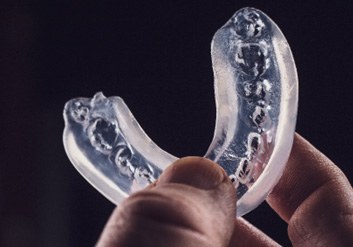
Being active is important for a healthy life, but certain activities come with risks for your smile. For instance, sports like basketball, football, soccer, or other sports could involve an impact to the face. Riding a bike, skateboard, or roller skates also potentially puts your teeth at risk of damage. As a result, you can better protect your dental implants by wearing a mouthguard while you’re having fun.
If you grind your teeth while you sleep, your implants’ foundation can weaken, but a nightguard can serve as a buffer and prevent damage to your smile.
Schedule Regular Dental Checkups

With some exceptions, dental implant failure typically occurs over time as a result of steady decline. If you come in for your routine checkups at least every six months, our team can catch and address these early signs of trouble. We will always be on the lookout for plaque and infection, and we can stop it from progressing to the point where your implants are in danger.
Advanced Dental Implant Procedures

The dental implant process is a bit different for each patient. To support the long-term success of your implants, we might determine that you need one or more procedures prior to dental implant surgery. These advanced surgeries might seem a bit intimidating, and they can extend your total treatment timeline. However, the benefits they offer will be well worth it in the end. Remember, the main goal is to rebuild a strong and beautiful smile that will stand the test of time!
Here are a few examples of advanced dental implant procedures that are necessary for some patients.
Bone Grafting
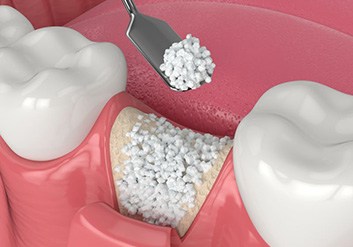
Following the extraction of natural teeth, the jawbone loses some of the stimulation and blood flow that it needs to stay strong and whole. Therefore, a process known as resorption begins. Basically, your body starts to recycle the jawbone’s raw materials, causing the bone to become thinner and weaker over time. This can interfere with its ability to support dental implants.
To correct this issue, we may perform a bone graft. By placing donor bone or artificial bone onto your jaw, we can make it stronger and bigger. After a successful graft, you should become a good candidate for dental implants! (In some cases, we are able to perform a minor bone graft at the same time that we place implants, so this procedure may not necessarily have to extend your total treatment timeline.)
There are multiple types of bone grafting procedures, so if your jaw is not quite able to support implants, we will take time to discuss the details of any recommended preparatory surgery with you.
Sinus Lift
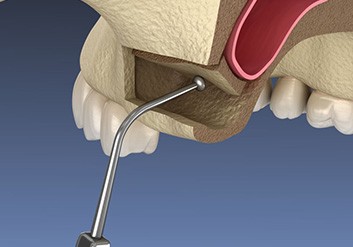
Due to resorption, genetics, or other factors, your upper jaw may not be thick enough to support dental implants. In fact, if we placed implants, they might penetrate your sinus membrane and cause complications.
To prevent such an issue, we may recommend that you undergo sinus lift surgery. During the procedure, we access the sinus membrane and gently shift it upward. Then, we place a block of bone beneath it to hold it in its new place. After the grafted bone integrates with the surrounding tissue, you may be able to receive implants. Usually, the integration process requires at least 4 – 5 months.
Ridge Augmentation
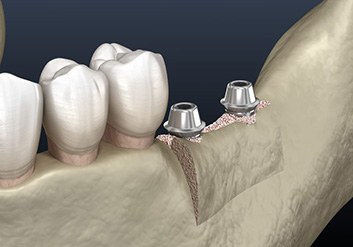
You may often hear it said that teeth and dental implants are placed in the jawbone. More specifically, though, they are embedded in a part of the jawbone known as the alveolar ridge. If your alveolar ridge is not wide enough to accommodate dental implants, you may need a type of bone graft known as ridge augmentation or ridge expansion.
During the procedure, we place a wedge into the ridge so we can insert bone material. After the graft is accepted, your alveolar ridge may be wide enough to provide a secure home for dental implants. It can take several months for the grafted bone to integrate with the surrounding tissue.
Dental Implant Failure & Salvage

Dental implants have an incredible success rate of over 95%! However, there is still a very small chance that your dental implant could fail. Fortunately, when issues are caught early on, we may be able to resolve them in time to save your dental implant. If you notice that your new dental implant is loose, uncomfortable, or painful, or you have other concerns about it, don’t hesitate to reach out to us.
Learn More About Dental Implant Failure & Salvage
Dental Implant FAQs
How Successful Are Dental Implants?
While many patients who are interested in dental implants are a little bit intimidated by the surgery, the risk of complications associated with the treatment is incredibly low. Around 95% of dental implants not only succeed, but continue to endure for over 20 years. The success rate of your dental implant varies on a few factors, including your own individual dental hygiene.
What Can Cause Dental Implants to Fail?
If you want your dental implants to stick around for as long as possible, it’s probably a good idea to know what pitfalls you could run into.
First of all, it’s vitally important to the long-term viability of your dental implant that titanium fuses effectively with the jaw. This process is called osseointegration, and if it doesn’t happen properly, it can hinder the stability of your implant. Fortunately, this is only a problem if you have a naturally impaired healing factor, or if you’re indelicate with the implants after the procedure.
The other major concern is infection, which happens if you don’t properly take care of your dental implant. For that reason, you need to take good care of your dental implant with thorough dental hygiene.
Am I Too Young to Get Dental Implants?
If a dental implant is placed in the jaw before it is fully developed, it could lead to complications in the bone’s development. It could also be the case that the implant moves or loosens as the jaw develops, making the procedure riskier long-term.
For this reason, we will not provide dental implants to children or teenagers. This will usually be delayed further for men, whose jaws typically take longer to develop.
Am I Too Old to Get Dental Implants?
On the other hand, you’re never too old to get a dental implant once your jaw has fully developed. Studies have demonstrated that, all things being equal, seniors have no more of a risk of dental implant failure than anyone else.
If you’re older, you may be at an elevated chance of gum disease or tooth decay, which can potentially cause complications for your dental implants. However, once those conditions have been managed, age won’t be a barrier between you and a brand-new tooth.

